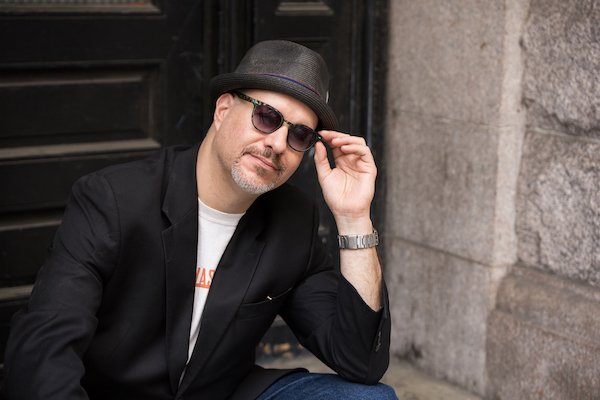Jan 13, 2026 2:09 PM
More Trump-Kennedy Center Cancellations
The fallout from the renaming of the John F. Kennedy Center for the Performing Arts to include President Donald…

Brian Charette’s latest album is a solo organ project titled Beyond Borderline.
(Photo: Anna Yatskevic)While he has supplied conventional, greasy-sounding Hammond B3 organ in straightahead settings—supporting masters like saxophonists George Coleman, Lou Donaldson, Charles McPherson and Houston Person—Brian Charette explores some uncharted waters on his latest SteepleChase release, Beyond Borderline. A follow-up to 2013’s Borderline, it once again finds Charette exploring tones, textures and tweaked harmonies in the exposed setting of solo organ.
Recorded live, the 12-track Beyond Borderline is another unconventional offering from the unorthodox organist. “I think at this point, it’s safe to say that I am the black sheep of the B3,” he laughed.
Aside from gorgeous renditions of Billy Strayhorn’s “Chelsea Bridge” and Duke Ellington’s “Prelude To A Kiss,” all of the other tunes on Beyond Borderline are Charette originals. “Silicone Doll” is his sly nod to Ellington’s “Satin Doll,” while “5th Of Rye” is a meditation on the fifth interval. Both “Wish List” and “Girls” use the harmonic language of contemporary classical composer Olivier Messiaen, while “Hungarian Bolero” is based on a Romani harmony. “There’s more notes in Messiaen’s scales so there’s, in effect, more possibilities for chords,” Charette explained. “And because I’m playing unaccompanied, the songs go wherever the harmony takes me.”
In spite of the potent harmonic nature of his tunes, walking bass lines and syncopation are still very evident on the jaunty medium-tempo swinger “Girls,” the uptempo burner “Good Tipper” and the smoking “Public Transportation.”
“I don’t want my music to be overly cerebral or pretentious,” said the Connecticut native and longtime New York City resident. “I’m dealing in these kinds of heady concepts, but I’m trying to deliver them in a way that is easily digestible and not snobby.”
“Public Transportation” is the perfect example of Charette’s yin-yang approach to the B3. “I’m basically playing bebop on it, but I’m sprinkling in this other harmony, as well, so it sounds edgy,” he said. “One of my great areas of interest is taking this kind of Messiaenic harmony and dipping in and out of it, which is something I also explore with my sextet.”
On recent SteepleChase sessions with baritone saxophonist Ronnie Cuber and harmonica ace Yvonnick Prené, Charette made less audacious choices. “I was playing more of a supporting role on those records and being a little more conservative with my tone choices and drawbar settings,” he explained. “These Messiaenic harmonies can be a bit off-putting for traditionalists. But on my own projects, like Beyond Borderline, I’m going against the grain. I’m trying to give an alternative approach to the traditional Hammond B3 organ sound, but I don’t want to make it seem like I’m anti-Jimmy Smith or anti-tradition. I just have all these varied interests—traditional organ, classical piano, Olivier Messiaen, electronic music—and I’m trying to combine them together in a very personal way.”
It’s Charette’s “oddball” choices, he believes, that separate him from the pack. “If you listen to Joey DeFrancesco, this is the best Hammond organist there has ever been, in my opinion. And there’s no way that I can compete with him on that level. So, I’m trying to find a voice for myself that makes me easily identifiable.”
“I think my music sometimes leaves people scratching their heads a little bit, especially if they’re accustomed to a more traditional harmonic and sonic approach to organ music,” he said. “I’m trying to find a perfect balance where I can kind of have my own sound without alienating people. And I’m always trying to do these things gently, without pushing it too hard.” DB

Belá Fleck during an interview with Fredrika Whitfield on CNN.
Jan 13, 2026 2:09 PM
The fallout from the renaming of the John F. Kennedy Center for the Performing Arts to include President Donald…

Peplowski first came to prominence in legacy swing bands, including the final iteration of the Benny Goodman Orchestra, before beginning a solo career in the late 1980s.
Feb 3, 2026 12:10 AM
Ken Peplowski, a clarinetist and tenor saxophonist who straddled the worlds of traditional and modern jazz, died Feb. 2…

The success of Oregon’s first album, 1971’s Music Of Another Present Era, allowed Towner to establish a solo career.
Jan 19, 2026 5:02 PM
Ralph Towner, a guitarist and composer who blended multiple genres, including jazz — and throughout them all remained…

Rico’s Anti-Microbial Instrument Swab
Jan 19, 2026 2:48 PM
With this year’s NAMM Show right around the corner, we can look forward to plenty of new and innovative instruments…

Richie Beirach was particularly renowned for his approach to chromatic harmony, which he used to improvise reharmonizations of originals and standards.
Jan 27, 2026 11:19 AM
Richie Beirach, a pianist and composer who channeled a knowledge of modern classical music into his jazz practice,…